You’re listening to Burnt Toast! This is the podcast where we talk about diet culture, anti-fat bias, parenting, and health. I’m Virginia Sole-Smith. I also write the Burnt Toast newsletter.
Today I am chatting with Martinus Evans.
Martinus is the author of the brand new book Slow AF Run Club: The Ultimate Guide for Anyone Who Wants to Run. He runs Slow AF Run Club, a running community for folks to run in the bodies they have. He is @300poundsandrunning on Instagram.
I’ve been a big fan of Martinus’s work for a long time, so it was a super treat to get to talk to him. We talk about all things running in fat bodies, in otherwise marginalized bodies, in Black bodies, and how running as a sport needs to become so much more inclusive. Martinus has lots of great ideas about that.
By the way: I am not a runner. I have talked about having a dysfunctional relationship with running in the past. I have a lot of runners in my life who I love and I support running as a concept, but I’m not super into the minutiae of it. So even if you’re not a runner, you will get so much out of hearing this conversation with Martinus. He takes a really joyful approach to moving our bodies in general, and to thinking about how to make running and all fitness spaces into safer, more inclusive places.
And remember, if you order Slow AF Run Club from the Burnt Toast Bookshop, you can get 10 percent off that purchase if you also order (or have already ordered!) Fat Talk! (Just use the code FATTALK at checkout.)
PS. Don’t forget, we’re still celebrating two years of Burnt Toast with a 20% subscription discount!
Episode 97
Martinus
Alrighty, so, good morning, good evening, good afternoon to wherever you’re at in the world! My name is Martinus Evans and I’m a fat runner. I said it. I said the F word.
Virginia
We love it. We say all the time here.
Martinus
Hide your kids, hide your wives because we’re gonna say a lot of F words. I’m talking about fat.
Virginia
We can say the other ones, too.
Martinus
We’re gonna say a lot. I’m a fat runner. I’m also a run coach. I’m the founder of a community called Slow AF Run Club. We have about 10,000 members worldwide. You may have seen me on the cover of Runner’s World, you may have seen my naked body in Men’s Health. My journey and my goal right now is to get 1 million people to start running in the bodies they have right now.
Virginia
And we are here to talk about your awesome new book, Slow AF Run Club: The Ultimate Guide for Anyone Who Wants to Run. Tell us your running origin story.
Martinus
I was working at Men’s Wearhouse on my feet all day, commission sales in hard bottom dress shoes. Walking on concrete, like it’s carpet with concrete at the bottom. So, I start to develop some hip issues, which one would think would happen if you’re walking on concrete for 10 hours, right? When I go see my doctor who sent me to an orthopedic specialist, as I’m sitting there running down all the things: “Hey, Doc, I used to play football, currently working at Men’s Wearhouse. I’m on my feet all the time. My hip hurts like hell.” And he’s like, “Oh, I know what’s wrong with you.”
Me: “Okay, what’s wrong with me?”
Him: “You’re fat and if you don’t lose weight, you’re gonna die.”
Virginia
I mean, just not even dressing it up at all. Not even pretending.
Martinus
Tell me how you really feel. So I was like, I know I’m gonna die one day, but whats that got to do my hip?
Virginia
I’m here for hip pain.
Martinus
So then he goes on this whole thing of like you’re fat, you need to start walking, your stomach is a pregnant woman, all this other stuff. Like, “You need to get healthy.” And I just got fed up with his ass talking. So I was like, “I’m going to run a marathon, screw you, screw this. I’m going to run a marathon.” He laughs at me and tells me that’s the most stupidest thing he heard in all of his years of practicing medicine and then he went on to say if I did attempt to run a marathon, I’d die on the course.
So I am fuming. I want to bless him with these hands, but I know that’s not generally accepted anymore. But I stormed out the doctor’s office. I’m ruminating about this experience. I’m driving home and I drive past a running shoe store, make an illegal U-turn, go inside of there and tell them I need shoes and I need them now. They get me some shoes.
I then go home and in my apartment complex, there are three treadmills, two of them are already filled up with gazelles. So I’m inconveniently sandwiched between two gazelles who are running like bats out of hell. I’m sizing them up. One guy is going like 10 other guys going like 9. I think to myself, I can at least go 7. Fifteen seconds later when I pick myself up off the ground…
Y’all, I fell. I fell off the treadmill. The treadmill rejected me or my body rejected it.
Virginia
It was a mutual rejection. It was not happening that day.
Martinus
It was like two magnets, polar opposites. Rejection. I was on the ground. The treadmill was still running. And I was mortified. So, I gathered everything and got the hell up out of there with tears in my eyes and thinking to myself, maybe this doctor is right.
And when I got home, I had this tattoo on my right wrist. And I reached out to get the door and I see my tattoo. The tattoo says “no struggle, no progress.” This is a nod to the 1857 speech by Frederick Douglass. It goes something along the lines of:
If there is no struggle, there is no progress. Those who profess to favor freedom and yet deprecate agitation are men who want crops without plowing up the ground; they want rain without thunder and lightning. They want the ocean without the awful roar of its many waters.
And Frederick Douglass goes on to say that the struggle might be a physical one, it may be a moral one, it may be a mental one, but there needs to be some type of struggle in order to get progress with power. So, that speech always resonated with me as a younger child. Like, damn, imagine just sitting there like, “Fuck yes, we’re going to war. Freedom!” I want to be there.
I got this tattoo when I was pretty young and all of that was going through my head as I reached for the door knob, and I was like, Okay, I know what I need to do. And the next day, I went back out there, and the day after that, and the day after that, and ended up running my first marathon about 18 months later. And ran eight marathons since then, and 100 other different distances.
Virginia
That’s incredible. You said in the book you don’t remember that doctor’s name. I really, really hope he sees the book and he sees your Instagram and he just he knows in his heart what he did. I think he does.
So you started because you wanted to prove the doctor wrong. But when did you really start to love running? And what do you love about it?
Martinus
Oh, my first race.
Before then I’m pretty much training in a vacuum. I’m going to run early so nobody can see me because I’m still embarrassed in my body. Mortified. So I sign up for this 5k and I get there and I’m like, Alright, I know I’m slow so I’m just going to park myself in the back. So I go way back, Virginia. I go where there are moms with strollers and Golden Retrievers attached to them. I thought a mom and a stroller and two golden retrievers was going to run faster than me.
And then the gun goes off and I’m like, fuck, these moms and strollers are in my fucking way! I thought they were going to run faster than me. And as I’m continuing, I run past people and run past the moms. And then I run past like the people who are walking. And then I started to run past people who are actually running. And like, that’s when it hit me. I said holy shit, I’m doing this running thing.
Virginia
You are doing it.
Martinus
And when I crossed that finish line, I had the biggest smile on my face because it hit me. I was bitten by the running bug that day.
Virginia
And you were passing people, I’m assuming, who were thinner, who had that “runner’s body” that is obviously bullshit.
Martinus
I was shocking people. Like, imagine you’re running, you’re in your groove and this fat man runs past your ass. You’re like, “Wait a minute, I need to run faster.” So that was happening, too. People would be like, “Holy shit, I need to run faster. He’s running fast. I need to run faster.” I’m like, I’m just living life.
Virginia
Keep up if you can. I do want to talk about that, because a huge barrier for so many fat runners, for Black runners, for anyone running in a non-traditional runner’s body, who isn’t the gazelle on the treadmill, is this experience of feeling unsafe running in public places, of not wanting to go to the gym with the treadmills or go to the park because of what you’re going to experience.
Martinus
Yeah, let’s talk fat talk. This is something I had to experience my whole life. One of the experiences that that will be for the next book is when I was 10, or 11, I wanted to play Little League football. However, there is a weight limit like there is an age range. So like, age 10 to 12, or 9 to 11, and there’s also a weight limit that goes with that. So they put you on a scale.
Virginia
No! I’m already mad.
Martinus
They put you on the scale in front of everybody. And if you’re over a certain weight, what I experienced was a coach saying, “get that man a garbage bag.”
Virginia
To do what with? To put that terrible scale in and throw out?
Martinus
I wish! They made every kid who was over the weight limit run in trash bags to sweat the fat off.
Virginia
And you are how old?
Martinus
10 or 11? No older than 12. So it’s something that I had to experience early on in life. It’s a great metaphor for life. You’re fat, you’re overweight, you’re over this arbitrary weight, but you’re not old enough to go to the next to the next age range.
Virginia
And then when we talk about the stereotypes of fat people being unathletic and lazy. Could it be because we aren’t allowing them on the teams and they’re running in trash bags?
Martinus
Imagine internalizing that. Like, literally inside of a trash bag, you’re running. You put the trash bag on like a little shirt and poke holes in it. You’re a running trash bag. Kids are yelling at you, laughing, pointing, calling you garbage kid.
So as I get older, I have to be a lot quicker on my feet because as you get bullied, there’s two ways you can handle this. You can either accept it and cry. Or you can fight back. Martinus was the one who fought back and also talked shit about somebody. So, like, you called me fat. I’m gonna find that one thing about you and I’m going to harp on it. Your shoes are dirty, your mama is ugly, whatever, I’m going to let you know, right?
So as I get older and I’m out running, and I’m dealing with the stuff, these are some of the things that I’m also dealing with. People are honking their horns, people calling me fat, yada, yada, yada. And one of the things that I have to do is fight back. When they go low, we go high. Screw that, sometimes you got to troll the trolls.
Virginia
It’s true. It’s really true.
Martinus
Sometimes you got to troll their ass back and that’s the that’s the mode that I tend to take. Somebody honking at me in their raggedy ass car, let them have some of their own. You’re fat? Your car is raggedy.
But this is where mindset comes into play, right? One of the things that I do as a coach is to provide psychological safety so that the people that I am coaching are able to be able to fail or stumble along the way as they are embarking in his new journey of fitness.
Virginia
Tell us a little bit about what that looks like.
Martinus
What that looks like is like letting them know that obstacles and rising up in the face of adversity is a good thing. Because for a lot of people, they think it’s a bad thing. Like, oh, I face adversity, I’m slow. Here’s the thing I always get is “I started running. And then I got a little tired. And I started walking. And I felt absolutely horrible that I had to walk.” And then I come in and say well, what was wrong with that? Did you start running again? “Yeah, I did.” What the fuck? Like, let’s celebrate that then.
It’s that thing of letting people know that it’s okay to bumble and stumble and figure this thing out. Because you’re doing something with your body that you have not been A. celebrated to do and B. you’re kind of stifled. Like being a plus size person, you may have even been stifled with your with movement because you haven’t had the liberty to actually explore the things that your body might be able to do. You got to explore and figure all this stuff out. So that’s where providing psychological safety is letting them know that it’s okay.
It’s almost like, imagine the kid who’s like riding a bike for the first time. They ride the bike, you let it go. They lose their balance. They fall, they scrape their knee, they are going to cry. They’re going to be like, “Oh, I don’t want to ride this bike anymore. It’s horrible. I don’t want to do this. Don’t make me do this.” But as a good parent, or as a good coach, you’re going to be like, “Okay. Let’s cry it out. You done crying. Okay, now let’s get your ass back on that bike.” Right? Right.
The same thing is true with physical activity. Alright, you did it. You got a side stitch. Okay, cool. Let’s figure this out. Oh, you got shin splints? Okay, cool. Let’s figure this out. Oh, oh, you got delayed onset muscle soreness? Great. Let’s figure this out. But guess what? Your ass is going to continue to move. That’s the approach that I take. We’re going to fall off.
Somewhere around us being grown it starts to be embedded in us like that doing something and then failing or not getting it right on the first time is a bad thing. I think it’s school. I blame school.
Virginia
Yeah, I think school is a lot of it. I’m thinking like when a baby’s learning to walk, they fall a million times and people aren’t like, you should stop trying to walk. You know what I mean?
Martinus
Imagine that, watching a baby trying to walk and saying, “Screw you, baby. You suck. Damn you for trying to walk.”
Virginia
“You’re a fat baby who can’t walk.”
And yet, we have this narrative that then kicks in of somehow, if I have to stop to walk during my run, that’s a moral failing. Like, walking and running are morally equivalent activities, right? Like, if you’re walking some of it, if you’re running some of it. If you are slow, that is still running. There’s no need to be attaching all these values to it. But it does seem like the culture of running at large is so built on that paradigm and you are really challenging an entire paradigm here.
Martinus
Yes, I am. Here’s why. If you’re not an elite athlete whose life depends on winning prize money, and going to the Olympics, all of us are then paying for a participation medal to participate in a parade.
Virginia
I really love relabeling marathons and other races as parades. That is what they are.
Martinus
Depending on some municipalities, when you go get the permit is literally a parade permit. So we are all paying to participate in the parade and to get a medal at the end if there is a participation medal. So if that’s the case, then none of this shit matters, whether we get there slower than the the elite runners or the last person because we’re all participating in this parade.
Virginia
Talk a little about course time limits, because that’s a really clear way that not everyone is allowed in the parade.

Martinus
It is a big problem. Last time I checked, my money is still as green as somebody who finished the race before I did. Yet, a lot of these races, like I said, they fall on the laurels of doing it the old school way, where racing was just for white men or even women. So all of that stuff is based off that and then they they fall on a thing of like, well, municipalities and blah, blah, blah, and like we’re working with all these other people to make this happen and there’s no way we can we can add an extra hour. And we’ve been here all day, volunteers, blah, blah, blah. And my thing is, get creative. Get creaive. As a slow runner, I understand you can’t have a city open all day long for a parade. However, can you get creative with it? Can you give us a rolling start? Can you give the people who actually want to participate in this and let them know “hey, you can start before everybody else but you may not be supported. But when the race is officially open, you will be supported.” Yeah, I can tolerate that.
Virginia
Especially because in the beginning you’re starting out strong and you’re less likely to need the support versus the final five miles or whatever.
Martinus
Exactly. But what they do is they line us up speedwise, they put all the fast people in the front, they put all the slow people in the back and say good luck.
Virginia
In the book, you talk about your experiences of harassment from support wagons. These are the people who are there to make sure people finish the race safely.
Martinus
Yes. All of that goes into like my anger. Now I’m as infuriated as you are when I mentioned trash bags.
Virginia
Oh my god, I’m so angry about that.
What else do we need to do to make running a more inclusive sport across the board?
Martinus
I go to these conferences where race directors come together and try to figure out how to do better and all this other shit. Their big thing is diversity. But it’s always diversity from a race standpoint or diversity from a gender politics standpoint, right? So while they’re arguing and trying to figure that out, they need to really think about pace diversity and people who are also in the back of the pack. Because we pay money as well to participate.
When you go back to the olden days, the old schools, the good old days of running it is usually a sport for white men, right? Women didn’t even participate in this because they thought your uterus was gonna fall out or some shit.
Virginia
That was a big concern of ours. Uteruses just flying out of us all the time.
Martinus
I don’t know why they thought that. It wasn’t falling out before a run but it’s like, well, if they ran 26 miles it is just gonna drop.
Virginia
All these uteruses at the finish line, just piling up.
Martinus
What are we gonna do with all these uteruses?
Virginia
I mean, it would have been messy. You can see why they were concerned. But somehow we’ve managed.
Martinus
Y’all persisted somehow. Kegels or whatever kept your uterus from falling out.
Virginia
We did it.
So it was a very white male sport, a very thin white men’s sport, too.
Martinus
As a Black man, I think that there are things that people in general just need to think about as being a person of color, right? There have been situations where I’ve been slammed on police cars. I’ve been investigated or stopped during a run because it’s like, “what are you doing running?”
Virginia
Literally just that.
Martinus
I mean, I’m in the brightest gear ever. And the police are talking about like, “as soon as you saw my car, you started running.” I was like, “well that’s a lie. I was already, running. I got 20 miles, why are you stopping me?”
So I think like those are other things that we also really need to think about. How do we protect all of our all our populations so they can feel feel good and feel safe to participate in the sport?
For example, I was at Boston Marathon and the big thing was mile 21 is where like the proverbial wall is. So there are tons of people cheering and things of that sort. And this group called the Pioneers Run Crew are also there. Historically, they are people of color and they’re not doing anything different from a traditional race spectator. However, the police presence there is a lot more, because they are “impeding on the racers.” However, there are people who have got like balloon arches and are passing out beers and shots and things of that sort and there’s no police presence there.
Virginia
That’s really infuriating and needs to be something that the people organizing the races are talking more directly with the municipalities and with the police forces ahead of time, about how we’re going to create a safe space for everybody.
As opposed to right now, where people are noting it when it happens and sort of reacting backwards as opposed to actually addressing this issue head on.
Martinus
Yes. It’s like nobody has forethought.
Virginia
Which is interesting because it’s not like it’s only just happening for the first time.
Martinus
Yes. And then the last thing is—and this is just the hill that I’m willing to die on—that if I’m paying for this race, y’all should have a shirt size to fucking fit me.
Virginia
That seems too basic.
Martinus
I feel like it’s lazy. Or they’re like, “a larger size costs more.” So what? Pay the extra $2 or $3.
Virginia
As you said, everybody is paying to be in the race, so you’re all entitled to a shirt.
Martinus
If you got a race that has 20,000 people in there, what you maybe have 50 people who need a 3x or larger shirt?
Virginia
Which, right there is a problem because you should have way more than 50 people who need that shirt if you’re making it an inclusive sport.
Martinus
Do a fucking dollar cost average analysis across all the other 20,000 fucking shirts you just bought.
Virginia
I think you can work it out.
I appreciated in the book when you were talking about post-race recovery and depression. I really appreciated your mention of working with a therapist during that time. And I do just want to name especially for a lot of the folks listening to this, running can be so amazing, but it can also be a disordered behavior for lots of folks. I wondered if we could just talk a little bit about that piece of things.
How do you think about that? How have you made sure your own relationship with running stays positive?
Martinus
Well, anything that can be counted can be a distorted activity. And something about running is numbers and paces and all the other shit that comes along with it. So one of the things that I work on or things I do—of course, therapy, I’m a big advocate for that—is make sure there’s some boundaries around running, making sure like running is not my end all be all. I think that is a big thing that for most people, getting them to understand is that running should not be your end all be all. And if that’s it, that’s the problem.
So with that being said, I do other things. I like playing video games, I like walking, playing fetch with my dog. I like spending time with my wife, I make sure to add those things in there so I’m not obsessive over the numbers. Because anything that has numbers, we can be obsessive over. The other thing that I really do is I make a plan and I stick to it. Or, or at least try to stick to 80 percent of it.
Virginia
Yeah, that seems fair.
Martinus
That way I’m not beating myself up. Knowing that it’s averages. That’s something as a coach that I spend a lot of time getting people to feel comfortable with, is that, hey, you don’t have to run every day to be considered a runner.
Virginia
Yeah, that’s a big one.
Martinus
It’s okay to take breaks and this is what you’re doing in the breaks. I think for a lot of people, they just need the permission to do that.
I got an email earlier today where, I asked people on my email list what’s one thing that you’re struggling with? And somebody was like, “Well, I just don’t have the motivation to do it. I don’t know what to do.” And others responded back to says, “this is your permission to get your ass off the couch and go run.” And I was like, “this is just what I needed.”
Virginia
So it can go both ways. People need permission to do this and people need permission to not do it.
Martinus
So really getting really to understand for you which one it is because you’re either going to be one of those types of people, somebody who needs permission to go do it, or the permission to say, hey, it’s okay to take a break and you’re golden. Yeah, I’m more on the other end.
Virginia
I feel like I can be both of those people at different times of day.
And then let’s talk a little bit about the weight loss piece of it. You are someone who has certainly been in the intentional weight loss space. Now you’re really big on running for the joy of it. I’m sure that also helps with keeping the running in a positive place for you,
Martinus
I think that since I’ve been on both sides of the scale, I get it. I go back to the story of the garbage kid, right? I go back to thinking my whole life that my body is disgusting so that I need to fix it and go through this whole intentional weight loss thing, right? Like so much so, Virginia, that my first degree was in exercise science in hopes that I can learn everything possible so I can make myself a particular weight.
Virginia
I think that is so common among folks who go into exercise science and also nutrition.
Martinus
I think one of the things that happened to me, the come to Jesus moment, or to come to Allah moment, or to come to Buddha moment is: I had a car accident after my first first marathon. So, I ran my first marathon, lost some weight, and got into a bad car accident, totaled my car, couldn’t run for about seven months, lost everything that I lost or gained, lost all the progress. Got sad, got depressive, got suicidal.
And I remember, I was at UConn at this time. So I was a grad student at Uconn and I remember it was the first 50 degree day, I’m driving. And if anybody has ever been on UConn campus, you go over this hill and it’s all these runners running and shit. And I remember talking to myself and telling myself, if I’m able to run again, I’m gonna run for the joy of it. I don’t care if I’m 100 pounds lighter or 400 pounds, I don’t care. I just want to run.
Because when I lost this weight, I wasn’t 90 pounds happier. I wasn’t happier because I lost this weight. Most of the time, it came with more strife because it’s one thing for you to be plus size and people be like, Oh, you need to lose weight, be healthier, blah, blah, blah. But it’s another stab in the heart when somebody tells you I like the Fat Martinus better. Like, “I liked you better when you was fatter.” I don’t like this person you are now because you’ve lost this weight.
Virginia
What didn’t they like?
Martinus
You’re damned if you do and you’re damned if you don’t. So to go through that whole situation, and be like I’m not 90 pounds happier. My life did not necessarily miraculously change like all the infomercials told me it would. But what I enjoyed the most was the running aspect of it. The talking to random strangers while I’m running this race, participating in this parade and getting my medal, that provided me the joy that I really enjoyed, versus all the other shit that came along with weigh in Wednesdays and all the other bullshit that came along with that. So that was more or less my metamorphosis.
The cool thing was, since I did have this degree in exercise science and I learned all this information about cardiac rehab and strength training and all this other shit, I can pretty much flip it on its head and use it against all the diet culture trolls, because their knowledge comes from… I want to say a Ponzi scheme.
Virginia
Not wrong, not wrong.
Martinus
Their information comes from false science and all this other stuff. But I actually took the courses and have the research to back up the things that I was saying. So when people were like, why don’t you lose weight, you’ll be healthier. You know, I can have that that that conversation with them. Is it a healthy aesthetic? Or Is it actually health? Do you actually know my A1C, blood pressure, any of that stuff? No, you don’t. So that means you’re just assuming I have those things because of my outer appearance. What you’re pretty much telling me is, “Why don’t you have more acceptable aesthetic?”
Virginia
It’s never really about health when they say, “But what about health.” And I can see how that helps you stay focused just on the joy of running and then keep running in proportion to the rest of your life in a in an important way.
Martinus
The other thing through that, Virginia, is that I’m also able to have insight to the people I work with because I’ve also been been a part of that journey.
Virginia
I hear so often from folks and I feel this, too: Finding people [running or doing whatever kind of exercise you enjoy] that you feel safe with and who get your experience is so crucial. I’m just so over going to a class and having to mentally turn down the volume on the diet-y talk from the skinny instructor. I’m done with it. I’m not doing it anymore. And so finding folks like you, like Lauren Leavell, like all these people who are giving us programs that center our bodies, is so so powerful.
"It's Not About Growing The Biggest Booty"
One last piece of this is that running is also a sport that’s pretty inherently ableist. It’s obviously based on being able to run, which not everybody can do. And as we’re talking about making the sport more inclusive, I’m wondering if you have thoughts on that piece of it as well.
Martinus
Well, here’s the thing is that when you get to marathoning, right? It’s a super ableist sport. Some of these marathons do have hand cycles or wheelchair stuff, but that shit is expensive.
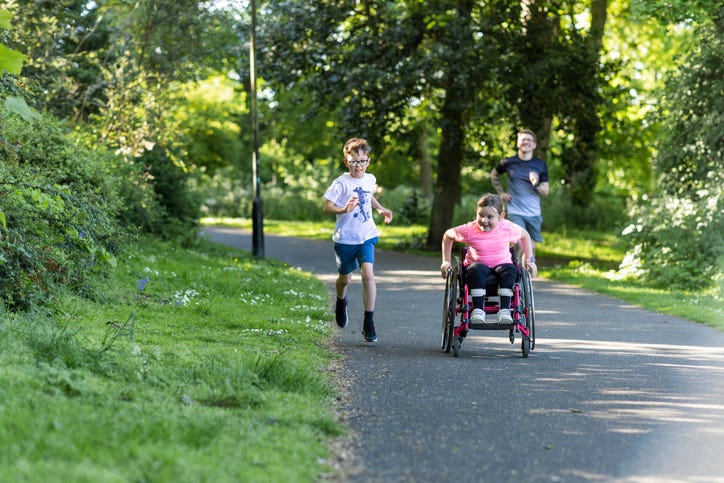
Virginia
Definitely.
Martinus
You have to have the money to even have one of those things, to even afford a not even just one cycle but multiple cycle bikes or multiple racing wheelchairs. And I think that that’s another thing that a lot of people may not be able to get into. Because that shit takes a lot of money.
So it goes back to the race directors getting creative. How we can we get creative so that more people can participate in the sport? And really enjoy the gravitas that comes with like running a marathon or running a half-marathon everybody can participate in. But it really goes back to the race directors, like, what are you doing to be creative? What resources are you doing? How are you educating yourself? Are you staying within your same circle of people that you have conferences with? Then you’re not necessarily growing. You need to go to a conference that focuses on disabled individuals or disabled athletes to really understand where they’re coming from, their point of view in order to help make the sport more equitable.
Butter
Martinus
Can I have two pieces of butter?
Virginia
You can have multiple butters.
Martinus
Okay. Black Girl Sunscreen.
Virginia
Oh, I don’t know about this. Tell me.
Martinus
It is a sunscreen that was created by women of color. And it’s one sunscreen that does not give me one of those white hazy thing faces that comes along with sunscreen. They have it in like—I want to say flavors? They have multiple different ways where it’s like they have one that’s like a gel basis, like matte, so if you sweat it is more of a matte. They have one that’s like make it glow where it kind of glows on you.
Virginia
That’s a great butter.
Martinus
I like that. Also, Hoka shoes. I love a good Hoka.
Virginia
They’re everywhere now.
Martinus
Yes, they are everywhere. I really just love this shoe. I really love what they stand for and it’s by far one of the most comfortable shoes that I wear outside of running.
Virginia
I was gonna say it really lives up to the comfort hype.
Martinus
And then the last piece, I might do a shameless plug for myself: Slow AF Run Club Merch. I’ve spent a lot of time and effort in order to make clothing that’s accessible. So most of my clothing goes from XS to a 5x or 6x. One of the things that I really love about that for this piece of butter is that it shows that someone who does not have the experience in clothing—because I don’t—can figure it the fuck out with no budget. Just the little budget that I have.
It proves that these brands can do it. They just choose not to.
Virginia
To your point about let’s get creative. Well, that is awesome butter.
My butter this week is something I was thinking about as I was reading your book. I’ve talked about this a little bit on the pod, but I had a pretty disordered relationship with running in my 20s. It was definitely not not a good space for me and I had to put it down for a long time and really put down all exercise for a long time. I have gotten back to exercise in the last five years or so and found a lot of joy in different forms of exercise.
And then in the last three months or so, as I’ve been in the season of book launch, I have not been exercising because I am just too damn tired. But I realized I also haven’t been spiraling about the lack of exercise. Like, I trust that it will be back.
I trust that I’m in that season of I need the nap on a Saturday afternoon more. I need time in my garden, which is also movement and joyful, but I also need just still, peaceful time in my garden and to trust that it’s coming back. And I would just like to shout out to taking those recovery periods when you need them and recognizing that not every season of life is marathon season or whatever your equivalent is.
Martinus
Absolutely. I agree. I like that piece of butter.
Virginia
Well, this was great. Tell folks where they can follow you. How we can support your work? Everyone needs to go get the book, that is your number one assignment. But what else do you need from us?
Martinus
Yes, go get the book! It’s available wherever books are sold. If you want to know more about the slow AF Run Club, you can visit the website. We also have an app on iOS and Android so after you get done with this podcast, open up your app store and download our app. Come on in, we have 10,000+ individuals who are here to love on you and get you running in the body that you have right now.
And then you can find out more about me on my personal Instagram. And yeah, if you’re interested in Slow AF Club merch, you can go to slowafstore.com.
Virginia
Amazing. We will do all of that. Thank you, Martinus, for being here.
The Burnt Toast Podcast is produced and hosted by me, Virginia Sole-Smith. You can follow me on Instagram or Twitter.
Burnt Toast transcripts and essays are edited and formatted by Corinne Fay, who runs @SellTradePlus, an Instagram account where you can buy and sell plus size clothing and also co-hosts mailbag episodes!
The Burnt Toast logo is by Deanna Lowe.
Our theme music is by Jeff Bailey and Chris Maxwell.
Tommy Harron is our audio engineer.
Thanks for listening and for supporting anti-diet, body liberation journalism!

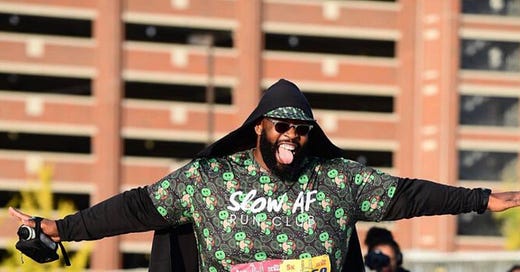




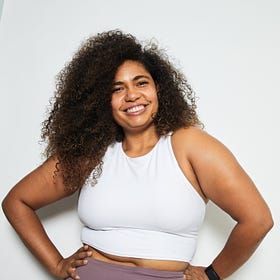




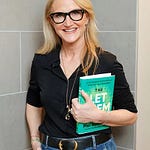
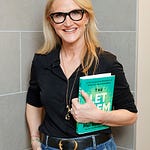




Share this post